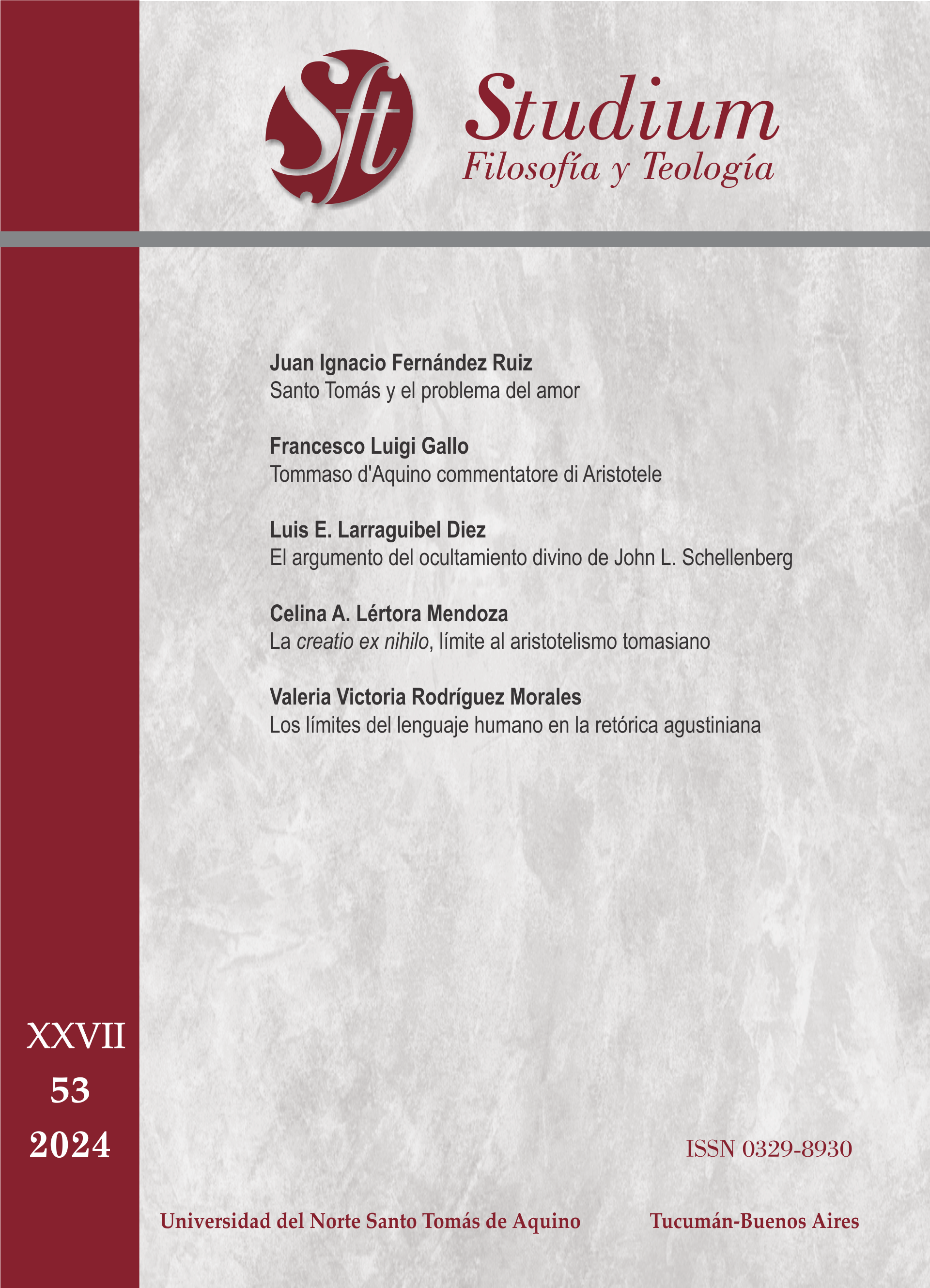Los límites del lenguaje humano en la retórica agustiniana
Un análisis basado en De doctrina christiana a la luz del De Magistro
DOI:
https://doi.org/10.53439/stdfyt53.27.2024.93-106Palabras clave:
San Agustín de Hipona, retórica, docere, lenguaje interiorResumen
Este artículo sostiene que los límites del verbum vocis, paradójicamente, le dan sentido al esfuerzo del docere humano en la retórica agustiniana. Se espera ilustrar a lo largo de la investigación que esta hipótesis se sigue del análisis del concepto de docere en libro IV de De doctrina christiana a la luz del De Magistro. Se pretende alcanzar este objetivo a través de tres etapas. En primer lugar, se analizarán las funciones de la retórica agustiniana, en especial, la enseñanza, en De doctrina christiana IV. En segundo lugar, se profundizará en los límites del lenguaje en el docere según las reflexiones del De Magistro. Finalmente, se realizará una síntesis de ambas descripciones, basada en De Trinitate, para mostrar que los límites del lenguaje no son una limitación en la retórica agustiniana, sino la realización de su propio sentido.
Descargas
Citas
Agustín de Hipona. (1792). De doctrina christiana (E. de Zeballos, ed. y trad.). Cano.
Agustín de Hipona. (1956). De Trinitate. En L. Arias (Ed.), Obras de San Agustín: Vol. 5. Tratado de la Santísima Trinidad. Biblioteca de Autores Cristianos.
Agustín de Hipona. (1958). De doctrina christiana. En B. Martín Pérez (Ed.), Obras de San Agustín: Vol. 15. Biblioteca de Autores Cristianos.
Agustín de Hipona. (1963). De Magistro. En V. Capanaga, E. Seijas, E. Cuevas, M. Martínez y M. Lanseros (Eds.) Obras de San Agustín: Vol. 3. Obras filosóficas. Biblioteca de Autores Cristianos.
Agustín de Hipona. (1995a). Las Retractaciones. En T. C. Madrid (Ed.), Obras de San Agustín: Vol. 40. Escritos varios. Biblioteca de Autores Cristianos.
Agustín de Hipona. (1995b). De Doctrina Christiana (R. H. P. Green, ed.). De Doctrina Christiana. Oxford University Press.
Agustín de Hipona. (2013). Confesiones (J. Cosgaya, ed.). Biblioteca de Autores Cristianos.
Anónimo. (1997). Retórica a Herenio (S. Núñez, ed.). Gredos.
Aristóteles. (1982). Tópicos. En M. Candel Sanmartín (Ed.), Tratados de lógica. Gredos.
Aristóteles. (1999). Retórica (Q. Racionero, ed.). Gredos.
Cicerón. (2016). Sobre el orador (J. J. Iso, ed.). Gredos.
Gadamer, H. G. (1977). Verdad y método I. Sígueme.
Gadamer, H. G. (1998). Verdad y método II. Sígueme.
González, C. (2012). Hermenéutica y retórica en Gadamer: el círculo de la comprensión y la persuasión. Revista de Estudios Sociales, 44, 126-136. http://dx.doi.org/10.7440/res44.2012.12
Green, R. H. P. (1995). Notes. En R. H. P. Green (Ed.), De Doctrina Christiana. Oxford University Press.
Grondin, J. (1994). Introduction to Philosophical Hermeneutics. Yale University Press.
Grondin, J. (2008). ¿Qué es la hermenéutica? Herder.
Martínez, M. (1963). Introducción a De Magistro. En V. Capanaga, E. Seijas, E. Cuevas, M. Martínez y M. Lanseros (Eds.) Obras de San Agustín: Vol. 3. Obras filosóficas. Biblioteca de Autores Cristianos.
Pierantoni, Claudio. (2011). El verbum cordis formabile agustiniano y la imagen trinitaria en el hombre. Teología y Vida, 52(1-2), 197-210. https://doi.org/10.4067/S0049-34492011000100009
Platón. (1987). Gorgias. En J. Caloge Ruiz, E. Acosta Méndez, F. J. Olivieri y J. L. Calvo (Eds), Diálogos. Vol: 2. Gorgias, Menéxeno, Eutidemo, Menón, Crátilo. Gredos.
Vox. (1982). Inventio. En Diccionario latino-español español-latino (15ta. ed.).
















 Esta obra está bajo una
Esta obra está bajo una 